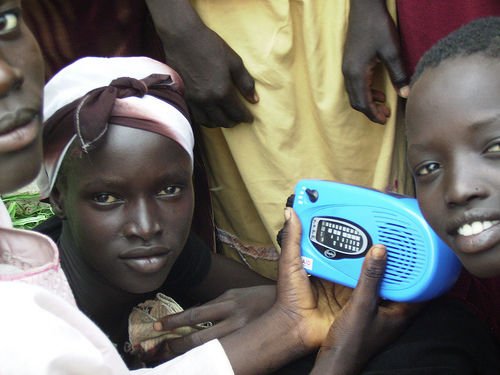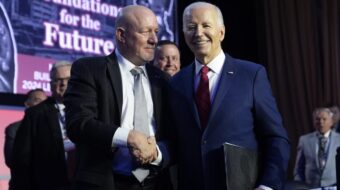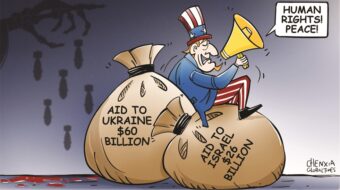
Sudanese opposition parties this week announced a boycott of presidential elections scheduled to take place in less than two weeks.
The April 11-13 poll will be Sudan’s first in nearly a quarter century in spite of the turmoil facing Africa’s largest country.
President Omar al-Bashir, who is standing for re-election, is under indictment by the International Criminal Court (ICC) for alleged war crimes. The Darfur region remains volatile despite a peace agreement between the government and two major rebel groups. South Sudan is set to vote on an independence plebiscite in January 2011. And millions of refugees from the country’s historic and recent conflicts remain internally and externally displaced.
Last month 17 opposition parties called for a postponement of the elections until changes were made to Sudan’s National Security Laws which they claim are used by the government to silence critics. In response, President al-Bashir warned that any rescheduling of the elections would also delay the South’s referendum on independence. He also threatened to expel foreign election observers if they advocated an election postponement, saying he would “cut off their fingers and crush them under our shoes.”
Now the major opposition parties have announced the presidential poll boycott citing concerns about insecurity, particularly in Darfur, and vote rigging. For now, some parties have vowed to participate in the local and regional elections, while others declared a total withdrawal, including the Sudanese Communist Party (SCP).
The United States special envoy to Sudan has been meeting with opposition representatives in an effort to salvage the elections.
Foreign governments have been closely watching events in Sudan, and encouraging the election process, for a number of reasons. Sudan is situated in an unstable region, with armed conflicts in many of its neighboring countries, yet it has substantial oil reserves and abundant cultivable land. Foreign investments in oil and agriculture are extensive and Sudan exports gold, cotton, sesame, and gum arabic.
The upcoming elections had been generating some positive press coverage, rare for a nation mostly associated with the decades-long North-South civil war and the more recent conflict in Darfur. For example, last month the Guardian ran an article headlined “An African success story in Sudan,” suggesting the polls may bring some stability to Sudan. It highlighted the series of accords – such as the 2005 Comprehensive Peace Agreement (CPA) between the central government in Khartoum and the semi-autonomous South Sudan, February’s peace treaty with the Darfur rebel groups, and the non-aggression pact signed the same month by Sudan and neighboring Chad – which paved the way for this month’s polls.
While relations between Sudan and Chad certainly have improved, as they vowed to cease support for rebels groups threatening each other’s governments, the peace agreements within Sudan are far more tenuous. Tension between Khartoum and South Sudan remain strong, and occasionally results in violence, despite the fact that al-Bashir’s National Congress Party shares power with the south’s Sudan People’s Liberation Movement (SPLM). The south disputed last year’s national census which found the region’s population to number only 21% of that of the north, but in February the two sides agreed to increase the number of parliamentary seats allocated to the South.
In Darfur, fighting and displacement continues as not all of the armed groups there signed the peace agreement with Khartoum. Many observers have questioned how an election could be held in such circumstances.
There is no denying the horrific nature of Sudan’s conflicts, but the corporate media generally covers Sudan in simplistic and inaccurate ways, reducing complex and historic issues to clashes between Muslims and Christians in the South or Arabs and “Black Africans” in Darfur. This type of stereotyping is a legacy of colonialism and plays into the propaganda used to promote America’s so-called War on Terror.
All Sudanese are Africans, most are Muslim, and the population of Christians is lower than the number of Sudanese who practice African (“animist”) religions. Sudan’s enormous geographic size and vast ethnic, linguistic, and religious diversity were determined by European imperialists when they carved up the African continent in the 19th century.
The British administered their Sudan colony as two separate provinces but centralized power in the north when independence was granted in 1956. Civil war between the north and the south continued for most of the following decades, until the 2005 peace agreement, claiming an estimated 1.5 million lives.
The Darfur conflict, too, did not merely arise because of recent religious or “racial” conflict but has its roots in complicated historic relations between farming and pastoralist communities as well as underdevelopment and neglect by ruling elites since independence. Additionally, the Sudanese-Chadian border, another creation of European imperialists, divides ethnic groups who in the past were united.
Nevertheless, western human rights groups have accused the Sudanese government of war crimes in Darfur, where the United Nations estimates nearly 300,000 have died since the conflict erupted in 2003. Last year, the ICC issued an arrest warrant for al-Bashir, the first for a sitting head of state.
The Sudanese president has dismissed the ICC’s allegations against him as politically motivated and he has received support from the African Union (AU) which views the arrest warrant and his indictment as setbacks to peacemaking efforts in Darfur.
The AU has made a huge investment in resolving the conflict in Darfur, as evidenced by the 19,000 African peacekeepers deployed in the region. Moreover, some African commentators have accused the ICC Chief Prosecutor, Luis Moreno-Ocampo, of selective justice or even racism, as he has consistently investigated and charged Africans while ignoring war crimes committed by Israel in occupied Palestine, for example. Just this week, the ICC announced an investigation of violence surrounding Kenya’s 2007 elections after a request made by Moreno-Ocampo.
African countries also are opposed to the South’s secession from Sudan largely because of the precedent it would set on a continent rife with separatist movements often encouraged by foreign powers. Additionally, neighbors worry about possible regional instability, as the South is underdeveloped and not united, a special concern for countries with growing economies like Uganda, where significant oil reserves have recently been discovered. According to the East African newspaper, this apprehension is shared by western nations which have urged the government in South Sudan to “go slow” on breaking away from Khartoum.
It is only within these larger historic, regional, and global contexts that recent events in Sudan can be understood. The elections in Sudan have meaning not only for its people but neighboring countries, multinational corporations and imperialist powers, as well.
With the most of Sudan’s political parties, including the SPLM, now boycotting this month’s presidential vote, the only major contenders for the office are al-Bashir and Abdallah Deng, a Southerner and member of the Islamist splinter group known as the Popular Congress Party (PCP). The PCP is headed by Hassan al-Turabi, the leader of Sudan Muslim Brotherhood organization, and the brain behind the 1989 military coup which brought his former ally al-Bashir to power.
Sudan’s Communist Party, founded in 1946, initially joined other opposition parties in the presidential election boycott and then announced its total withdrawal from the elections. SCP Secretary General Muhammad Ibrahim Nugud was a candidate for president on a platform of national unity and development, opposing the secession of the South, where it maintains an active political base. The SCP was very influential in Sudanese politics until its repression in the early 1970s. Party activity and membership has grown steadily since the signing of the CPA in 2005 as evidenced by its presidential campaign.

MOST POPULAR TODAY

‘Warning! This product supports genocide’: Michigan group aims to educate consumers

Ohio: Franklin County treasurer attends Netanyahu meeting, steps up Israel Bond purchases

Hold the communism, please: SFMOMA’s Diego Rivera exhibit downplays artist’s radical politics

“Trail of Tears Walk” commemorates Native Americans’ forced removal

After months of denial, U.S. admits to running Ukraine biolabs






Comments